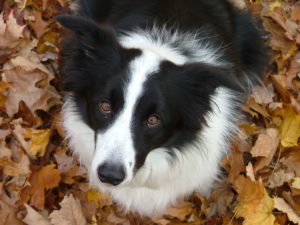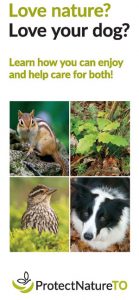 Dog ownership and exercising dogs through regular walks provides health and social benefits to pet and owner alike. However, many people may be unaware of the unintended consequences of their dog-walking behaviours. Recent research (see Factsheet Oct 2019 and Factsheet Aug 2016) carried out in urban areas comparable to Toronto has shown that off-leash dogs have a strong negative effect on wild animals and their natural habitats.
Dog ownership and exercising dogs through regular walks provides health and social benefits to pet and owner alike. However, many people may be unaware of the unintended consequences of their dog-walking behaviours. Recent research (see Factsheet Oct 2019 and Factsheet Aug 2016) carried out in urban areas comparable to Toronto has shown that off-leash dogs have a strong negative effect on wild animals and their natural habitats.
Wild animals perceive dogs as predators. The frequent presence of dogs in natural areas may indirectly cause harm or even death through displacement to less desirable areas, reduced feeding, and increased stress, especially in young animals or pregnant females. Uncontrolled dogs may also kill wildlife directly or injure them enough to cause subsequent death. Dog urine in sensitive wildlife habitats “marks” the territory, which can make it unsuitable for wildlife. Furthermore, dog scent repels wildlife even after the dogs are gone.
 Dog traffic, digging and urine/feces inhibit the growth of young trees and ground layer plants, leaving bare earth open for invasive plants and impairing natural forest regeneration. Dog fur and paws pick up seeds which can spread invasive plant species. Allowing dogs off-leash or off-trail increases the risk of injury to the dog as well as disease transmission to/from wildlife (e.g. canine distemper) and even to humans (e.g. Lyme disease). Both migratory and resident birds may be disrupted by dogs; ground nesters and shore birds are especially vulnerable.
Dog traffic, digging and urine/feces inhibit the growth of young trees and ground layer plants, leaving bare earth open for invasive plants and impairing natural forest regeneration. Dog fur and paws pick up seeds which can spread invasive plant species. Allowing dogs off-leash or off-trail increases the risk of injury to the dog as well as disease transmission to/from wildlife (e.g. canine distemper) and even to humans (e.g. Lyme disease). Both migratory and resident birds may be disrupted by dogs; ground nesters and shore birds are especially vulnerable.
For more information see Our Publications. See also City of Toronto Dogs in the City webpage.
See also our submission regarding the proposed dog off-leash area at Sir Winston Churchill Park (Nordheimer Ravine).
